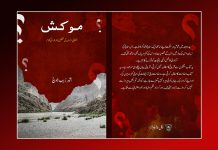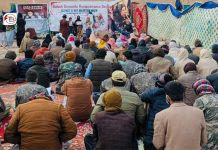Europe’s leading think tanks have declared that the China Pakistan Economic Corridor or CPEC is violating the human rights of the people of Gilgit-Baltistan, a disputed territory over which the highway passes, and its construction is causing immense ecological damage to the region.
Willem Oosterveld, a strategic analyst at the Brussels-based Hague Centre for Strategic Studies, said, “There are certain international legal provisions for when you can or cannot build in occupied territory. But this as a case is not easy to compare with say Israeli settlements in Palestine,” adding that the CPEC does not conform to international law.
Rights activists across Europe have roundly condemned the China-Pakistan Economic Corridor (CPEC), which is being ruthlessly implemented against the will of the local population of Gilgit.
Claudia Wadlich Heidelberg, a German activist and writer, said, “China uses the OBOR (One Belt One Road) – economy to conquer strategic positions through Asia till Africa and Europe to gain world power. Democratic intentions and free world trade are not their goals.”
Dr. Siegfried O. Wolf, Director of Research at the South Asia Democratic Forum, another Brussels-based think tank, said, “Concretely, it is not enough that Pakistan fights militant groups turning against the Pakistani state (institutions and agents), but the country must also stop its support for Pakistan-based cross-border terrorists operating in India and Afghanistan.”
They highlighted the fact that the implementation of the multi-billion dollar project is being enforced violently, leading to large scale and systematic human rights violations perpetrated by the Pakistan Army.
Experts believe that the Pakistani Army was engaged in the forceful evacuation of people from their traditional homesteads and farmlands in several areas of Gilgit Baltistan and Balochistan so as to make land available for the CPEC.
Recently, United States Defense Secretary James Mattis had also questioned the legality of the China-Pakistan Economic Corridor (CPEC) as it passed over the disputed territory of Gilgit-Blatistan (GB).
The CPEC project comprises a network of railways, roads and pipelines that would connect Pakistan’s port city of Gwadar in Balochistan with the Chinese city of Kashgar in the landlocked Xinjiang Uyghur Autonomous Region.
Local inhabitants in Gilgit Baltistan and Balochistan are being forcefully cleared for the project, rendering people homeless and depriving them of their sources of livelihood.
Some analysts believe the project will heavily cause ecological imbalance in the region.
Yoana Barakova, a research analyst with the Amsterdam-based European Foundation for South Asian Studies (EFSAS), said, “Gilgit Baltistan is completely excluded from the high financial profits that a project like the China Pakistan Economic Corridor would bring. Despite the fact that this corridor would cross the region and produce a number of negative environmental and ecological impacts, Gilgit Baltistan is already facing serious environmental problems in relation to climate change because of air and water pollution, inadequate waste disposal, natural resources depletion, deforestation, loss of biodiversity and glacier melting.”
Ms Barakova added, “There is an abundance of water resources, minerals worth billions of dollars and an ocean of undiscovered tourism potential in this part of Jammu and Kashmir. Gilgit Baltistan has notable reserves of copper, coal, iron, silver, and gold among other metals and minerals. The factories whichwill emerge during the construction of this corridor will use all the minerals of Gilgit Baltistan as raw material for which the population will not be paid royalty. The region is also blessed with considerable reserves of uranium.”
A large number of political and human rights activists from Pakistani held Kashmir, Gilgit Baltistan, Balochistan and Sindh have been facing sedition charges for opposing the CPEC project.
Many of them have been booked under the Anti-Terrorism Act and are languishing in jails across Pakistan.




























